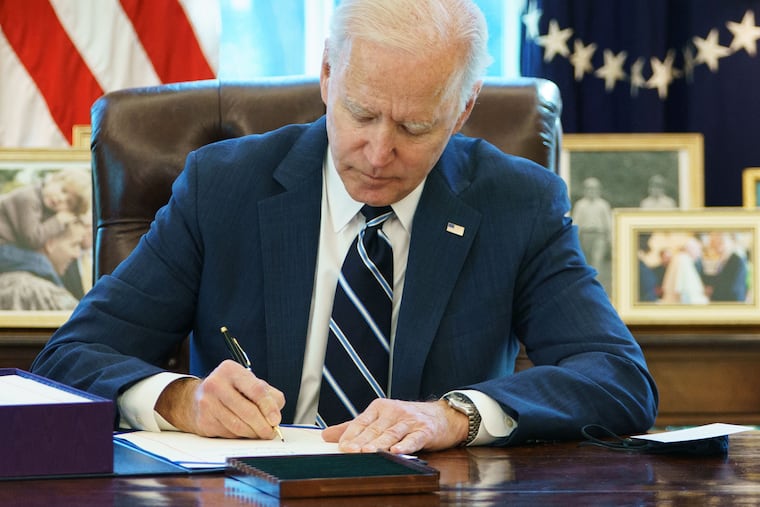The $1.9 trillion stimulus is a prescription for health. Trust me, I’m a doctor. | Expert Opinion
Addressing poverty is an evidence-based means of improving health.

The $1.9 trillion stimulus is going to stimulate more than the economy — it’s a prescription for health. Trust me, I’m a doctor.
By ensuring our country’s children have their basic needs met, we are choosing to invest in our future — expansion of the Child Tax Credit will pay dividends in the long term.
Imagine having to choose between paying for a heating bill or medication. Or trying to take your mind off of your empty stomach to focus at work or school because you can’t afford to buy food. At least one out of 10 people in the United States may not have to wonder, because they — maybe you — live in poverty. Sadly, children are even more likely to live in poverty, with one in six children falling in that category. The COVID-19 pandemic has made things even harder, with many individuals worried about their ability to recover from 2020′s economic devastation.
» READ MORE: The temporary expansion of the Child Tax Credit should become permanent to help Philly’s families | Opinion
As a physician, I have been working on the front lines to support families as they navigate the stressors of the pandemic and economic instability. So I’m pretty thrilled by the expansion of the Child Tax Credit in the recently passed American Rescue Plan Act of 2021, and the potential 50% decrease in the child poverty rate. You should be, too.
As a pediatrician, I acknowledge I’m biased toward children. My job entails ensuring my patients reach their full potential, i.e., ensuring health equity for my young charges. As the Robert Wood Johnson Foundation describes it, health equity means “increasing opportunities for everyone to live the healthiest life possible, no matter who we are, where we live, or how much money we make.” Unfortunately, so much of what determines health is outside of my hands. Poverty is a significant social determinant of health; as the adage goes, “cash rules everything around me.”
That means ensuring financial stability is a health issue as much as a fiscal one. Poverty is associated with worse health outcomes. Risk for developmental delays, diagnosis with asthma, development of chronic conditions (e.g., heart disease and diabetes) is all higher. And for those keeping a tab at home — all of those conditions come at a cost, often one that is absorbed by society as a whole, be it directly or in lost economic productivity.
What’s more, 2020 highlighted another, longer-standing public health crisis in America: systemic racism. Black individuals are more likely to have less wealth, more likely to have poor health, and more likely to have been negatively affected by the pandemic both in terms of their health as well as their financial situation. Dismantling racism is a complicated topic, but addressing poverty will definitely help.
» READ MORE: President Biden’s economic relief package could cut childhood poverty in half — but it’s only temporary
Rarely do we have opportunities to step up and tackle such a critical problem that underlies so many ills (and illnesses) as poverty with interventions known to work. I’m ecstatic we didn’t pass this one up. Now, we need to take steps to make this action permanent. The Stockton Economic Empowerment Demonstration, a universal basic income program wherein families received $500 a month for a year, recently showed how impactful financial security can be. People reported better health and less depression, spending money on basic needs, and being more likely to transition into full-time employment. It’s time to put the “welfare queen” and other hackneyed, false narratives to bed.
The decision to expand the Child Tax Credit should have been about people, not politics. The bill was shepherded by Democrats, despite proponents on the other side of the aisle espousing child benefits as well. Rather than just kissing babies, politicians should take the steps to actually support them. From Reagan to Clinton to Trump, tax credits have been advanced by both parties as means of addressing poverty. Our current national polarization notwithstanding, I hope we can agree that our children are the best of us. They depend on us to find the best in ourselves to allow them to thrive. There’s more work to be done — this poverty-busting intervention shouldn’t expire in 2022. This isn’t a gamble — addressing poverty is an evidence-based means of improving health. I say we go “all in” with making sure our nation’s children have the financial stability they need to thrive.
George Dalembert is a senior fellow of the Leonard Davis Institute of Health Economics. He is the founding director of the CHOP Medical Financial Partnership, which tackles poverty through community-based, cross-sector collaborations.